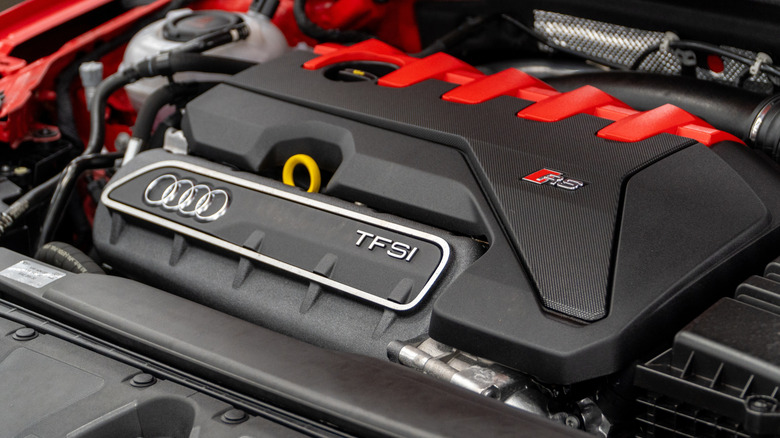What Does TFSI Stand For, And How Does The Audi Engine Tech Work?
Luxury auto manufacturers are constantly looking to push the envelope of power and efficiency, and Audi has stood out from the pack with the TFSI system installed on its turbocharged engines. Audi consistently releases vehicles with impressive performance figures, typically from smaller displacement engines, that are able to match pace with larger naturally aspirated engines.
Audi is able to do this with the TFSI system. TFSI stands for Turbo Fuel Stratified Injection, and, in Layman's terms, means the engine has fuel directly injected into it at precise moments when the turbocharger is active. Audi claims this helps deliver an impressive mixture of performance and low fuel consumption.
The Audi A3, for example, features a turbocharged four-cylinder 40 TFSI engine. The 40 number indicates the range of the A3's potential output, though the brand states the small luxury car has 201 horsepower. With that amount of power under the hood of a small car, you'd expect there to be a drop-off for fuel efficiency. However, the Quattro-equipped A3 can do 24 mpg in city driving and 34 on the highway, according to the EPA.
What does fuel injection even mean?
While Audi's TFSI system is truly impressive, direct fuel injection systems have been around since the 1950s. Direct injection systems do exactly what their name implies, there are small valves that inject fuel into the engine as the gas pedal is pushed down. That fuel mixes with the oxygen in the engine's combustion chamber, igniting and providing power to the vehicle.
Before the invention of fuel injection systems, the only way cars were able to provide engines with a mixture of air and fuel was with a carburetor. Carburetors mixed air and fuel to a specific ratio before allowing the mixture into the combustion chamber, making it a much simpler process than fuel injection. However, the introduction of microchips into vehicles allowed for fuel injection systems to be much more efficient than carburetors, and a lot of cars would eventually stop using carburetors.
Now, nearly every Audi vehicle available features a TFSI engine. Audi even adds TFSI technology into its hybrid models. Fuel injecion technology has become the standard in modern vehicles, making carburetors a thing of the past on anything but low power vehicles like scooters.

